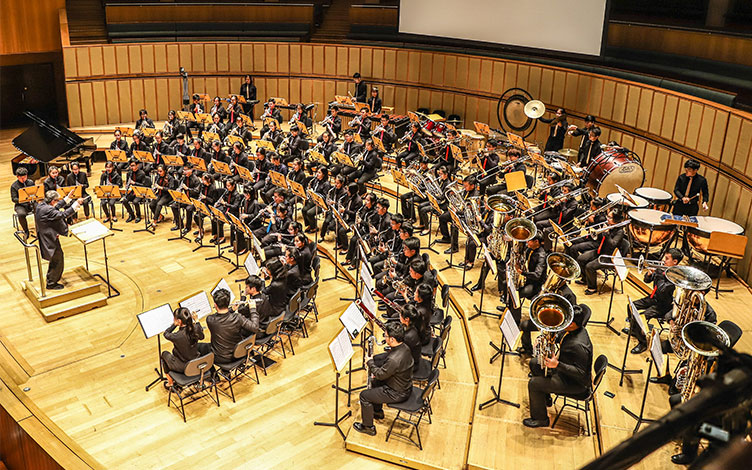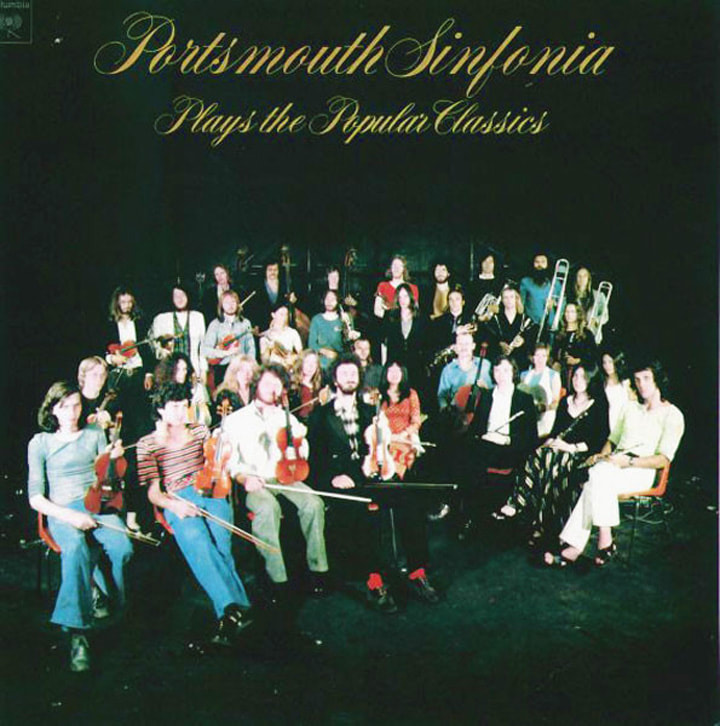There were certain things about getting a degree in music education that I never really understood.
Like "symphonic" band. A band that's "symphonic" ? Is it "stereophonic", too?
I knew there was a PR obsession in the university front office with marching band. It was a major fundraising tool.
But symphonic band?
There was very little about symphonic band that was symphonic. Concert band? Both were marching bands that sat while students performed in evening wear.
Like "symphonic" band. A band that's "symphonic" ? Is it "stereophonic", too?
I knew there was a PR obsession in the university front office with marching band. It was a major fundraising tool.
But symphonic band?
There was very little about symphonic band that was symphonic. Concert band? Both were marching bands that sat while students performed in evening wear.
We were practicing about six hours a week - which was a big tome commitment. A semester's worth of symphonic band music usually came out to be about eight to ten pieces that we went over and over and over again.
One of the first unappreciated questions I asked the director of symphonic band was “When do we play a symphony?”
We never did.
By the time I was a junior, I was playing professional band and orchestral gigs with several of my teachers. I was playing trumpet on some, tuba on others, and double bass on quite a few as well. While I was not a virtuosic player, the reason I was getting so many gigs was that I networked, was a vicious sight reader, knew how to fit in, and could play in a variety of styles. Many of my peers were strictly legitimate classical-sounding players who, when an arrangement called for something with a swing or pop music sensibility to it, suddenly sounded mechanically square. I could get a good Howard Johnson sound on a tuba, go between Snooky Young and Marvin Stamm on trumpet, and could mimic Ron Carter, Richard Davis, and Jimmy Blanton on bass.
On one of my summer gigs at the Rehoboth Beach band shell, I was sitting next to my trumpet instructor. I remember turning to him and asked, "If we were expected to come into a gig like this, sit down, take out our horns, and play perfectly for two hours - with no practice sessions - , why do we have to rehearse the same few pieces ad nauseam in symphonic band?" His only response was a wry smile.
A better use of some of our “symphonic” band time would have been for us to put down our primary instruments and have a band practice where we were playing an instrument that was very foreign to us but that we would soon be teaching children. College flutists trading in their flute for a trumpet, trumpet players playing oboe, trombone players playing saxophone, dogs and cats living together... mass hysteria! You get the picture. It would have been a much more instructional and informative use of our time to have experiences similar to those that our future students would be grappling with new instruments.
The problem with this picture would have been that the college teachers would have been on the spot. They would be in the dicey position of having to create the eponymous silk purse from a sow's ear: a beginner's band tghat sounded good. Nobody likes to expose themselves to potential failure and that could have easily happen to any high-minded college professor working with a bunch of music majors who were suddenly playing foreign instruments for the first time.
They actually did this at Portsmouth Art School in the 1970s. They released an album in ‘73, “Portsmouth Sinfonia — Plays The Popular Classics”. This was a classic album of immense proportion and importance.
Not.
One of the first unappreciated questions I asked the director of symphonic band was “When do we play a symphony?”
We never did.
By the time I was a junior, I was playing professional band and orchestral gigs with several of my teachers. I was playing trumpet on some, tuba on others, and double bass on quite a few as well. While I was not a virtuosic player, the reason I was getting so many gigs was that I networked, was a vicious sight reader, knew how to fit in, and could play in a variety of styles. Many of my peers were strictly legitimate classical-sounding players who, when an arrangement called for something with a swing or pop music sensibility to it, suddenly sounded mechanically square. I could get a good Howard Johnson sound on a tuba, go between Snooky Young and Marvin Stamm on trumpet, and could mimic Ron Carter, Richard Davis, and Jimmy Blanton on bass.
On one of my summer gigs at the Rehoboth Beach band shell, I was sitting next to my trumpet instructor. I remember turning to him and asked, "If we were expected to come into a gig like this, sit down, take out our horns, and play perfectly for two hours - with no practice sessions - , why do we have to rehearse the same few pieces ad nauseam in symphonic band?" His only response was a wry smile.
A better use of some of our “symphonic” band time would have been for us to put down our primary instruments and have a band practice where we were playing an instrument that was very foreign to us but that we would soon be teaching children. College flutists trading in their flute for a trumpet, trumpet players playing oboe, trombone players playing saxophone, dogs and cats living together... mass hysteria! You get the picture. It would have been a much more instructional and informative use of our time to have experiences similar to those that our future students would be grappling with new instruments.
The problem with this picture would have been that the college teachers would have been on the spot. They would be in the dicey position of having to create the eponymous silk purse from a sow's ear: a beginner's band tghat sounded good. Nobody likes to expose themselves to potential failure and that could have easily happen to any high-minded college professor working with a bunch of music majors who were suddenly playing foreign instruments for the first time.
They actually did this at Portsmouth Art School in the 1970s. They released an album in ‘73, “Portsmouth Sinfonia — Plays The Popular Classics”. This was a classic album of immense proportion and importance.
Not.
Many of the Portsmouth Sinfonia members were classically trained musicians who one day swapped instruments, played the classical “hits”, and let the tapes roll. Needless to say, the comedy ensued.
Here is their rendition of Strauss’ “Also Sprach Zarathustra”.
Here is their rendition of Strauss’ “Also Sprach Zarathustra”.
Who can forget their “Hallelujah Chorus”?
Thrill to the sounds of their “Wilhelm Tell Overture”!
I always laughed when they referred to our ensemble of symphonic band because no matter what it did, at the end of the day, it still had that organ grinder wheeze to it.
I thought it would have been cleverer to hand out parts to actual symphonic orchestral scores, divi up the string parts to the flutes, clarinets, baritone, and tuba and then compliment the group with the normal instrumentation. It might not have been truly symphonic but it would have beeen a hell of a lot closer than some of the things we beat to death over a whole semester.
For that matter, the schedule should allow for all instrumental music majors to attend at least one weekly band session to work with a choral director. Instrumentalists could be introduced to elementary, junior high, and high school repertoire as well as absorb rehearsal techniques from a master choral director. Vocal parts coulb be played as well as sung. This kind of course would have been extremely beneficial to my first years teaching. Instead, figuring out choral work and singing on the job was similar to learning how to make a parachute after being pushed from a flying plane.
Hopefully by now, there are some peer-to-peer programs in place. A peer-reviewed journal would have been great. Freshman could keep a log of what pieces they were listening to. Every month or so every month or so they would share their listening journal with a mentor from the class one or two years above them. Seniors could share their journals with a faculty review committee that was not interested in grading them but doing a final once-over with advice on what to pursue in their listening growth during their last college year as well as beyond.
At the end of the day, of course, as musicians and music teachers, we are responsible for our successes and our failures. Some of us embrace that philosophy early in our lives while others never seem to figure it out. The bottom line is, once you step out of that college doorway for the last time, you are on your own.
I'll never forget that glorious feeling.
Finally, on my own.
I thought it would have been cleverer to hand out parts to actual symphonic orchestral scores, divi up the string parts to the flutes, clarinets, baritone, and tuba and then compliment the group with the normal instrumentation. It might not have been truly symphonic but it would have beeen a hell of a lot closer than some of the things we beat to death over a whole semester.
For that matter, the schedule should allow for all instrumental music majors to attend at least one weekly band session to work with a choral director. Instrumentalists could be introduced to elementary, junior high, and high school repertoire as well as absorb rehearsal techniques from a master choral director. Vocal parts coulb be played as well as sung. This kind of course would have been extremely beneficial to my first years teaching. Instead, figuring out choral work and singing on the job was similar to learning how to make a parachute after being pushed from a flying plane.
Hopefully by now, there are some peer-to-peer programs in place. A peer-reviewed journal would have been great. Freshman could keep a log of what pieces they were listening to. Every month or so every month or so they would share their listening journal with a mentor from the class one or two years above them. Seniors could share their journals with a faculty review committee that was not interested in grading them but doing a final once-over with advice on what to pursue in their listening growth during their last college year as well as beyond.
At the end of the day, of course, as musicians and music teachers, we are responsible for our successes and our failures. Some of us embrace that philosophy early in our lives while others never seem to figure it out. The bottom line is, once you step out of that college doorway for the last time, you are on your own.
I'll never forget that glorious feeling.
Finally, on my own.


 RSS Feed
RSS Feed